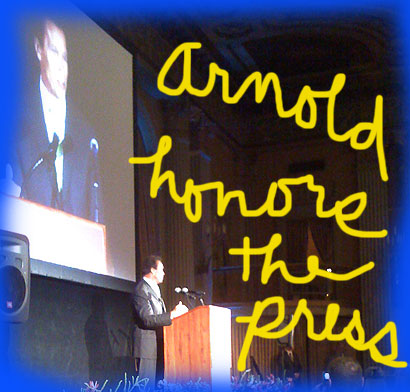
At the LA Press Club Awards held in the Crystal ballroom of the Biltmore Hotel Sunday night, Arnold Schwarzenegger delivered the welcome speech and rattled on pleasantly for quite some time—a little too long, actually—reciting a litany the things that didn’t get done, or got done wrongly, or not well, during his tenure that the press had helpfully pointed out. He end with “I’ll be back.” Back to where wasn’t clear.
Many hours and many, many, MANY awards later, Sean Penn presented the President’s Award to Andersen Cooper for his reporting on the earthquake crisis in Haiti. Cooper was very gracious but looked decidedly sleep-deprived and like every minute he was forced to spend in some LA ballroom instead of working on the gulf oil spill story was some form of punishment. (He told me when I asked that he was flying back Monday morning.)
In between, my gorgeous friend, actress Wendie Malick, was one of a group of celebrity types who were drafted to actually hand out the 79 trillion awards given. (I’ll link to them when the press club puts them online as there were many excellent and deserving people honored.)
The Daily Journal’s Greg Katz was one of those recognized. He got an award for the best investigative series (publications under 50,000) and as the print journalist of the year (also for papers under 50,0000).
I mention this because the terrific newspaper series that got Katz the awards was something called Revoked about California’s parole revocation system. Since it was published in the Daily Journal, it was hidden behind a pay wall, thus most of you likely didn’t see it. But Katz, (who Tweeted excitedly when he won) has kindly provided a PDF for your reading pleasure.
It opens this way:
Imagine you’re a defendant in a court system where hearings take place in prison, behind closed doors, while you are shackled to the floor.
You get an attorney who can subpoena witnesses, but the court doesn’t compel them to show up. Hearsay evidence from law enforcement is allowed, and you can be convicted without ever being allowed to confront your accuser.
There is no jury. There is also no prosecutor; rather the judge is charged with protecting the public safety, creating a duel role with an inherent conflict. This hearing officer may or may not be a lawyer.
To send you to prison, he does not have to find you guilty beyond a reasonable doubt, only 51 percent likely to have done what you’re accused of.
You’re not in Guantanamo Bay. You’re in California’s parole revocation system.
Read on here.
And while we’re on the topic of media, if you haven’t already, be sure to read Frank Rich’s dead on commentary in Sunday’s New York Times about the mainstream media’s utter shock over the fact that a smart Rolling Stone reporter actually just did his job and got a terrific story.

I was very surprised to hear that Mr. Katz won an award for the Daily Journal articles. As a parole defense attorney, I appreciated the first segment on the parole hearing process. The trampling of parolee’s rights on a daily basis is alarming. However, in the second segment, I felt that Mr. Katz chose one (awful) attorney to report on and to represent us all. I felt that this was an extremely unfair representation. Further, many of the people who were quoted in the article have expressed frustration at the way their comments were edited and taken out of context. Do we have some attorneys amongst us who are as bad as the attorney shadowed in the article? Yes (and I believe those attorneys should be removed from the panel). But, we also have a lot of other parole attorneys who fight every step of the way to ensure their clients rights and to make any small advancement possible for parolees.
Thanks for the comment, Kim. I’ve certainly spoken to some very good parole defense attorneys. But I’ve also been privy to the actions of the other variety. I can think of one recent instance, for example, when—at the request of the attorney— the family made a point of getting letters of support from employers and others who could attest to how well the parolee had been doing, and so on. (He was charged with a technical violation.) The attorney, by her own account, never read the letters before the hearing, nor did she bring them to the hearing or make any use of them whatsoever. Nor did she seem to do much else. It was disheartening.
But thank you again for the reminder that there are many, many fine people working in this field.